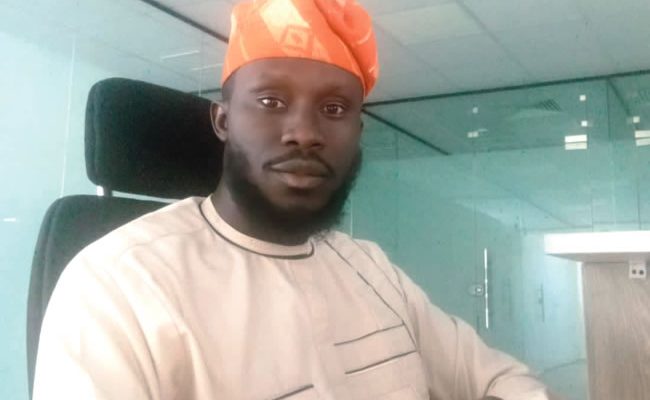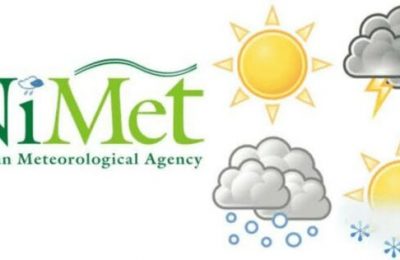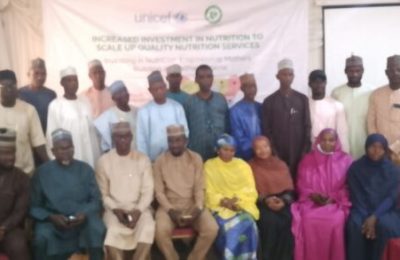
In this interview with BIOLUWATIFE AKINYEMI, Ibadan-based humanitarian and founder of H.A. Foundation, Mustapha Ridwan, spoke on the challenges facing youths in the country and his organisation’s activities.
Some so many young people are yet to figure out life as they want it. Why do you think that it is and what is the role of stakeholders in finding meaningful engagement for them?

Incontrovertibly, there are so many youths in the area you have stated. Some of these youths have diverse challenges impeding them from achieving success. Some have financial challenges and some do not have the right mentor to put them on track. I believe the stakeholders can come on board to collaborate with some leading non-governmental organisations to take insights from the challenges these NGOs are facing and see where and how to come in. The truth is that the government cannot see everything and the government cannot do everything. So, one of the reasons why we have countless NGOs is because social justice is not adequately served. If today’s government serves adequate social justice, people like us would put an end to our NGO because it will serve no purpose again. In that regard, we are doing this to assist the government. Thus, I believe stakeholders can collaborate with NGOs, most especially the leading ones to find meaningful engagement for the youth.
Some of these youths have worked with you on your various projects. How would you rate their performance and ingenuity on the projects?
As an individual, I move with people who have high ambitions and are always ready to progress in all ramifications. So, we motivate one another. This same set of people are my team members and they have been outstanding all along. We share the same orientation about life and have the same zeal for building a society free of conflict and violence. With that, we believe if we fail to contribute our quotas to shape the society for good, the society will prey on our coming generation. So, we are enlightened, and we have what it takes to contribute our quota, it is better we do it so that posterity would be lenient on our generation too. Secondly is that, in a society where social justice is not well-served, it is an invitation to conflict and violence. In other words, even if the government is not proactive in serving adequate social justice, the citizens can take up the responsibility, and that I think is one of the essences of NGOs. Hence, these are our orientations and focus on giving to society. The truth is, we are not rich, but we have little connections that can be accessed to contribute to our quota. We believe our conditions are still better off, compared to those who have no hope in the community. In summary, we are all youths in this regard and those who are working with me are extremely outstanding.
You’ve had some interventions done for young people in the past. What informed these and at what stage are they now?
First and foremost, I believe if we want to curb vices some youths are hankering after or we want to advise the coming ones, there should be an alternative that is of high quality, not just secondary alternatives. Alternatives in the real sense of it which they can build upon. Youths in huge numbers engage in cybercrime, prostitution and all other vices at a tender age. My experience so far is that quite an appreciable number of them do not have the basics from home and in the bid to fend for themselves, they lose focus. I remember vividly during my Master’s degree programme at the University of Ibadan, I used to stay outside the campus. I was on my way home after a night reading session in preparation for an exam and I met a late teenage girl, I couldn’t place her age accurately. She asked if I would be willing to have her (sexual relations) for a chicken feed. While going back to the campus for another night reading the following evening, I saw her carelessly having conversations with a guy who used to hawk at the Agbowó junction but she didn’t see me. I later visited that guy after my exams and asked him about the girl. He told me she was an orphan who used the stay with her grandmother in that area. The aged grandmother enrolled her tailoring, and after a few years, she could not fund her any longer due to stark economic challenges. The girl was left to do menial jobs to gather money for a sewing machine to facilitate her learning. On the verge of doing the menial jobs, she lost focus and started rolling with some girls who were far older than her on the streets. They introduced her to these illicit activities. I discussed with some like-minded fellows, and we then scheduled a visit with the grandma and her. Thereafter, we purchased a sewing machine for her and advised the family to relocate her to another environment which they did. What caught my fancy about this girl was her tender age. She was young and agile with a promising future. I still stay in contact with some members of the family. She’s presently preparing to take the next Unified Tertiary Matriculation Examination (UTME) in 2024. So, this is the basic intervention that fired my total interest in community service and ever since then, we have been doing our best to contribute our quota to the society. As we speak, an appreciable number of those who benefited from our UTME/JAMB forms are currently in universities such as UI, LASUED, BAYERO, FUNAAB, FCET-AKOKA, UNILAG etc. Also, some are presently writing WAEC-GCE, while some who benefited from the empowerment of sewing machines are doing fine. At the moment, all I can say is that we are gradually progressing, it may not be as pronounced as some other well-known NGOs, but the track of progress we are recording with our beneficiaries is mind-soothing.
What led you to the line of philanthropy and humanitarian services?
My motivation for philanthropy and humanitarian services was simply because I crave a society where everyone would be at peace with one another. A society where people assist the vulnerable to have a share of social justice. I am the kind of person who always likes assisting the needy in society. It saddens me as a person to see people going through hard times, I derive inner satisfaction from standing in a position where I will be able to help people. However, that is not to say that I have it all, but I believe assisting the vulnerable in my little capacity, the Almighty would take care of my affairs.
How would you describe the feedback you’ve gotten from these philanthropic acts over the years?
I must say it’s a thing of joy hearing satisfactory feedback from people and seeing that they are better than before. It always gives me inner satisfaction to see that those who benefited from the humanitarian services are doing better than before.
For instance, I remember a day when I visited a particular university in South-Western Nigeria for a wedding banquet, only for some students of this university to come one after the other to appreciate me because they benefited from the project we did during the UTME registration. I was highly elated to see that they were able to make it to that level. The same thing goes for those who benefited from empowerment projects of sewing machines and the aged welfare too. These and some other unreported narratives boost my morale to do more. In other words, it is having the positive effects I envisaged. At least, Rome was not built in a day.
What are the challenges you’ve been experiencing since the commencement of this project?
One of the major challenges I have ever faced is people having the belief that I am rich, or I have unlimited access to funds because of the humanitarian services that I am doing. Even when I have personal financial challenges, some people find it difficult to help because they have the notion that I have money, even if it is not mine. They believe I can easily take from the funds we solicited on behalf of people to take care of myself which is not supposed to be. Meanwhile, my orientation is that it is my duty to fend for myself and it is also my social obligation to assist those who need assistance in the community. Secondly, the challenge of dishonesty and insincerity has polarised our society. I remember I nearly got jailed in 2021 because I solicited funds for a man who had an accident and was hospitalised in one of the private hospitals in Ibadan. A sister, whose family patronises the private hospital told me that there was a need to assist the woman because they needed N500,000 for surgery. Then we told the woman to get the doctor’s consent letter with a phone number so that whoever wanted to verify the authenticity of the report could go ahead to the hospital or call the doctor. We started the donation, only for someone I did not know to call and tell me that the doctor was threatening a legal case, claiming we forged his consent to seek funds. He had informed his lawyer and they were only waiting to arrest my sister and I visited the doctor. It was there we got to know that the woman forged the letter containing the doctor’s consent. We pleaded with the doctor and he eventually dropped the legal case. Honesty and sincerity is a big challenge we are facing.
What is the aim of this foundation?
Our major aim is to serve humanity to the best of our ability.
Can you take us into the background of the relationship you share with your partner sponsors (if there’s any)?
During my undergraduate programme, I built smooth relationships with people. At one point, I was the Hall Imam and at another point in time, I was the treasurer of the Association of Faculty of Arts Students. I was also the Coordinator for the Faculty of Arts Muslim Students. So, throughout these phases, I encountered people of diverse backgrounds with varying degrees of orientation and ideologies. Despite that, I put in my best to build good relationships and trust, with a lot of them. This relationship and the trust I built are what serve as the backbone for the sponsorship of these projects. So, my former colleagues, majorly from MSNN-UI, are sponsoring a host of these projects. An appreciable number of them are outside the country, and those who are in the country with good jobs and businesses still get in touch to sponsor some of these projects. Then, we talk about the family members and well-wishers, most especially some like-minded elderly ones who are not in any way related to me, they see good in our projects and they are ready anytime to give their support.
What distinguishes your platform from other NGOs?
I would say we are all dedicated to serving humanity, but what distinguishes us from them is solely because a larger percentage of those who sponsor us are my former colleagues at MSSN, University of Ibadan.
When can you describe your biggest day as a humanitarian?
My biggest day was when I and my team visited an aged woman who was on the verge of committing suicide on account of stark economic challenges. She disclosed this after we handed over some food items to her, offered her financial assistance, and saw the pills she wanted to swallow. Knowing that our intervention saved this aged woman today continues to be a thing of joy for me. I was happy we intervened at the right time because I understand the essence and the divine rewards of saving a soul. Anytime I remember this incident, I always feel fulfilled that even if all I do is save that aged woman from committing suicide, I am satisfied and I have achieved.
What are your advice, suggestions, and wishes from the government, team members and members of the public?
I will suggest that the government should work assiduously on our ailing economy. A lot of people these days have more faith in the NGOs than they have in the government because they struggle to survive in the country. At the same time, we citizens should discharge our responsibilities duly and diligently.
For team members, humanitarian services are very stressful, it takes a dedicated mind to sail through. We are neither in competition with anybody, nor other NGOs. Our collective aim is to ensure we contribute our quotas to humanity.
Lastly, I urge the public to be honest and sincere in dealing with the NGOs, when we need assistance, we should be honest and sincere in our narration. Putting on insincerity and dishonesty would affect other people who are genuinely in need.
Where do you see your foundation in the next five years?
We hope to have contributed largely to humanity and it’s in our plan to start an orphanage.
READ ALSO FROM NIGERIAN TRIBUNE








